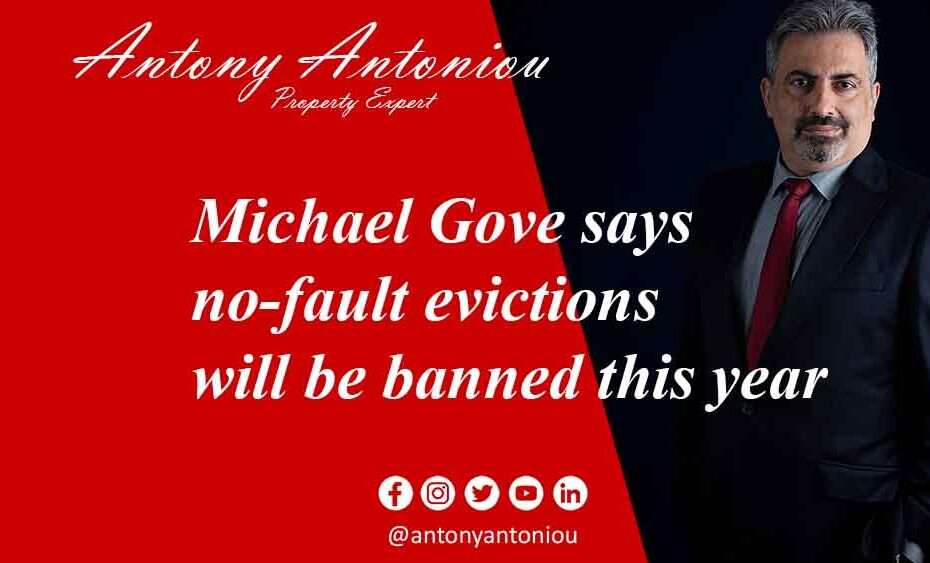Michael Gove says no-fault evictions will be banned this year
Housing Minister Promises Ban on ‘No-Fault’ Evictions Before Next Election
The housing minister for England, Michael Gove, has announced controversial plans to abolish ‘no-fault’ evictions for private tenants by the time of the next general election. This policy would remove the right of landlords to end tenancies at the conclusion of a fixed term without providing justification, by scrapping Section 21 of the Housing Act 1988.
On the surface, this reform seems focused on enhancing renters’ security and making illegal what some see as ‘revenge evictions’ used to eject tenants who complain about poor conditions. However, critics feel the motivation is largely political – a headline-grabbing attempt to woo voters rather than a meaningful attempt to solve the housing crisis.
Knee-Jerk Policy, No Overall Strategy
Activist groups have long lobbied for more safeguards against ‘no-fault’ evictions, so the announcement is likely to be popular with some. However, beyond this banner commitment there appears no coherent wider strategy to structurally improve home ownership affordability, increase housing stock, or drive market sustainability.
Instead, the policy smacks of a knee-jerk, politically-motivated move by a Government flailing desperately to garner support ahead of difficult elections. It comes on the back of mixed messaging around other housing policies, like proposed minimum E energy efficiency targets for rental properties, recently scrapped after pressure from landlords.
This reactive approach heightens uncertainty and deters the long-term investment so vital for restoring balance to the broken housing equation. Most experts argue that ending Section 21 without introducing accompanying measures around rent control and landlords’ property rights will actually worsen the situation for tenants by further discouraging supply.
Deep Problems in the Housing Market
Soaring demand against chronic undersupply has created a housing market apparently impervious to intervention, with runaway prices and worsening affordability. The crisis spans buying, renting, social housing and home building. House prices have risen by 52% nationally over the past decade, while wage growth stagnates and buyer numbers shrink.
The root causes of warped supply and demand are complex, including planning restrictions, buy-to-let investment pumping up prices, and failure to replace the sell-off of council housing stock. But simplest is chronic failure to build enough homes – an estimated 300,000 a year are needed, yet last year only 200,000 were built despite record numbers given planning consent.
Who is Benefiting From the Broken Status Quo?
Major developers are sitting on huge land banks with permission to build over a million homes, yet they drip-feed supply to keep prices high. The Government seems unwilling to intervene, appearing beholden to developer interests. Social housing waits stretch into years even for families in emergency need, yet there is little investment in new affordable homes.
In this context, Michael Gove’s announcement seems a distracting facade. It is understandable he does not want his party punished again at the ballot box for failing to tackle what voters see as the critical domestic concern. But if ministers truly cared about creating a fair, functioning housing system for all, real, bold reform would not be beyond reach given the resources available.
Taking a Strategic, Long-Term Approach
Serious commitment to overhauling the housing crisis would involve strategic steps like:
– Funding a major social housebuilding programme to replace sold-off council stock
– Imposing transparency and compulsory purchase orders on developers withholding consented land
– Overhauling the planning system to zone more land for high-quality housing schemes
– Taxing second homes and setting limits on expanding buy-to-let empires
– Incentivising renovation of the hundreds of thousands empty homes through VAT cuts on refurbishment
– Making fiscal policy adjustments to take steam out of house price inflation – like reviewing stamp duty brackets and capital gains tax reliefs
In summary
Promises to end ‘no fault evictions’ should be met with caution. Of course tenants need better protections. But this looks like a cynical political ploy without real substance behind it – an attempt to gain votes not solve deep systemic problems. Unless the Government can work across parties to formulate a proper long-term plan for fixing the housing disaster, generation rent will keep suffering and the housing holes in successive manifestos will grow larger. The time has come for real, bold, sustained action based on facts not electoral spin. The public deserve nothing less.
Main Announcement:
– Housing minister Michael Gove has announced plans to ban ‘no-fault’ evictions in England before the next general election
– This would remove landlords’ ability to end tenancies under Section 21 without giving a reason
– Comes after criticism of ‘revenge evictions’ used to force out complaining tenants
Reaction:
– Announcement welcomed by some as protecting tenants’ rights
– But concerns raised about lack of wider strategy to solve housing crisis
– Could further discourage landlord supply when more rental properties are needed
– Seen by critics as a quick policy fix to gain votes, not sustainable reform
Context:
– Change comes amid mixed signals on other housing policies like energy efficiency targets
– Chronic undersupply and unaffordability persist across all housing types
– Housebuilding consistently falls short of 300,000 homes a year needed
– Major developers accused of drip-feeding supply to keep prices high
– Hundreds of thousands of empty homes could ease crisis if renovated
Effective Strategy:
– Needs coordinated action on increasing overall housing stock
– Significant building of affordable and social housing
– Transparency and intervention on unused land banks
– Planning system changes to enable quicker quality development
– Tax and fiscal adjustments to discourage speculation and price inflation
Conclusion:
– While tenant protection welcome, announcement seen as political token without substantive plans for long-term reform

